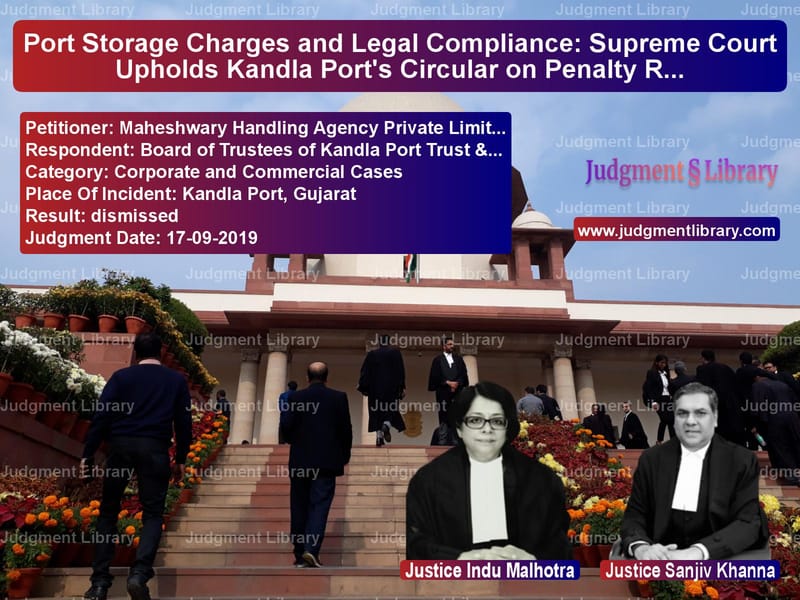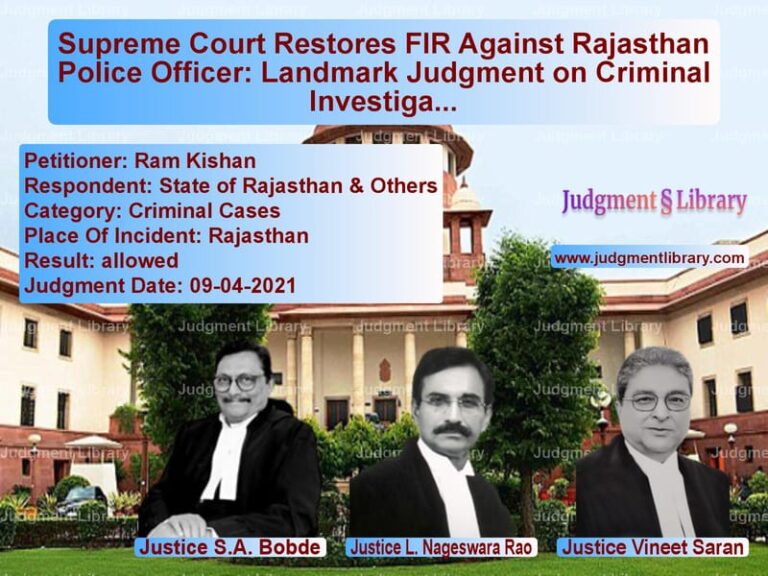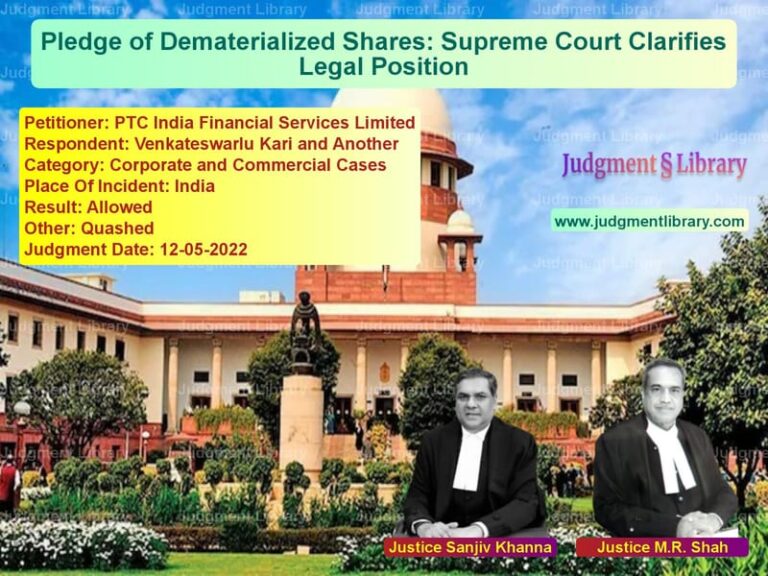Port Storage Charges and Legal Compliance: Supreme Court Upholds Kandla Port’s Circular on Penalty Rates
The Supreme Court of India recently ruled in the case of Maheshwary Handling Agency Private Limited vs. Board of Trustees of Kandla Port Trust & Others, addressing the issue of port storage charges, penalty rates, and the authority of port authorities in managing storage congestion. The case revolved around whether Kandla Port Trust had the legal right to impose penalty storage charges beyond a 60-day period, despite an earlier notification prescribing different rate slabs.
Background of the Case
The appellant, Maheshwary Handling Agency Private Limited, is a company engaged in clearing, forwarding, and transporting cargo for import and export at Kandla Port, Gujarat. The company used port storage facilities and was liable to pay charges as per the rates prescribed under the Major Port Trusts Act, 1963.
A Notification dated November 4, 1993 was issued under Section 52 of the Act, fixing a schedule of rates for cargo storage. However, on August 31, 1998, Kandla Port Trust issued a circular stating that storage beyond 60 days would be deemed unauthorized, and users would be liable to pay double the rent as a penalty. This circular became effective from October 1, 1998.
The appellant challenged the circular, arguing that it violated the earlier notification and unfairly imposed excessive storage charges.
Key Legal Issues Considered
- Whether Kandla Port Trust had the authority to issue a circular overriding the 1993 Notification.
- Whether penalty charges for storage beyond 60 days were legally justified.
- Whether the circular was arbitrary and violated Article 14 of the Constitution of India.
Arguments by the Petitioner (Maheshwary Handling Agency Pvt. Ltd.)
The appellant contended:
- The 1993 Notification provided different slabs of charges for varying durations, including rates beyond 60 days.
- The circular was an indirect amendment of the notification, which only the Tariff Authority for Major Ports could approve.
- There was no data to justify the claim that congestion at the port necessitated the circular.
- The retrospective application of penalty rates was unfair and legally unsustainable.
Arguments by the Respondent (Kandla Port Trust)
The respondents argued:
- The circular was issued to regulate port congestion and was within the authority of the Traffic Manager under Regulation 64 of the Port Rules.
- The 1993 Notification prescribed rates but did not prevent the port from imposing reasonable restrictions on storage duration.
- The circular applied uniformly to all users, ensuring fairness.
- The appellants had prior notice and time to vacate their storage space before the penalty charges applied.
Supreme Court’s Observations
The Supreme Court analyzed the legal framework and made the following key observations:
- The Traffic Manager has statutory authority under Regulation 64 to manage port congestion and storage use.
- The 1993 Notification only prescribed rates and did not grant an unlimited right to store cargo indefinitely.
- The circular did not violate the notification but merely imposed a condition to regulate storage for operational efficiency.
- The petitioners had failed to challenge the notification before, and the retrospective argument was not substantiated.
Final Judgment
The Supreme Court dismissed the appeal, upholding the validity of the Kandla Port Trust’s circular. The Court ruled:
“The circular merely implements an administrative regulation ensuring efficient port management. It does not override statutory provisions.”
The Court emphasized that the petitioners had been given sufficient notice to vacate storage, and the charges were legally justified.
Implications of the Judgment
- For Port Users: Cargo handlers must comply with storage regulations, and failure to vacate within prescribed periods may result in penalty charges.
- For Port Authorities: The ruling affirms their authority to issue regulations managing storage and congestion.
- For Legal Precedent: The judgment clarifies that administrative circulars implementing statutory objectives are legally valid.
Conclusion
The Supreme Court’s ruling reinforces the power of port authorities to regulate storage efficiently. The judgment ensures that cargo handlers cannot claim indefinite storage rights merely by paying scheduled charges. By upholding the circular, the Court has affirmed that regulatory actions taken to prevent congestion serve the greater public interest and are legally enforceable.
Petitioner Name: Maheshwary Handling Agency Private Limited.Respondent Name: Board of Trustees of Kandla Port Trust & Others.Judgment By: Justice Indu Malhotra, Justice Sanjiv Khanna.Place Of Incident: Kandla Port, Gujarat.Judgment Date: 17-09-2019.
Don’t miss out on the full details! Download the complete judgment in PDF format below and gain valuable insights instantly!
Download Judgment: Maheshwary Handling vs Board of Trustees of Supreme Court of India Judgment Dated 17-09-2019.pdf
Direct Downlaod Judgment: Direct downlaod this Judgment
See all petitions in Company Law
See all petitions in Corporate Compliance
See all petitions in unfair trade practices
See all petitions in Judgment by Indu Malhotra
See all petitions in Judgment by Sanjiv Khanna
See all petitions in dismissed
See all petitions in supreme court of India judgments September 2019
See all petitions in 2019 judgments
See all posts in Corporate and Commercial Cases Category
See all allowed petitions in Corporate and Commercial Cases Category
See all Dismissed petitions in Corporate and Commercial Cases Category
See all partially allowed petitions in Corporate and Commercial Cases Category







